Andrew W.K: the interview
The party monster talks about J-pop, noise and Lee ‘Scratch’ Perry
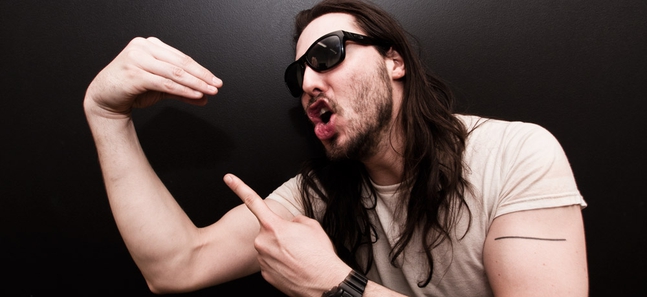
Posted: Tue May 22 2012
The pumped biceps and haircut haven't changed, the T-shirt's still as filthy as ever. A decade after the NME hailed him as 'the saviour of music', Andrew W.K. still looks much the same as the 22-year-old rock god who incited audiences to party 'til they puked on his debut album, I Get Wet. It was a divisive prospect, to say the least: while some critics thrilled at the record's lunatic blend of '80s cock rock, Abba-grade pop hooks and dance beats, others seemed more inclined to agree with Pitchfork's Ryan Schreiber, whose 0.6-rated review opened with the words 'Alright, this is bullshit'. Yet even some of the haters (this writer included) were won over by Andrew W.K.'s live show, one of the most overblown, joyous and – yes – sweaty gigs I've ever witnessed.
The ensuing years have been interesting for the singer and multi-instrumentalist, born Andrew Fetterly Wilkes-Krier. There was the time he broke his foot onstage during the tour for sophomore album The Wolf – a tour that he completed in a wheelchair. There were his three seasons as presenter of the Cartoon Network show Build Destroy Build. The move into Fox News punditry. The improvised solo piano album. The Gundam covers album. The record he produced for dub legend Lee 'Scratch' Perry. The side career as a motivational speaker. The persistent rumours that Andrew W.K. wasn't even Andrew W.K. And now, against all odds, he's back on the road again: on a world tour in support of the 10th anniversary of I Get Wet.
Did you feel that there was always going to be a strong demand for a 10th anniversary tour?
No, it was more that we realised 10 years had gone by – and also had regained the technical ability to do a full-blown, full band tour. There were a lot of business issues, contractual problems and things like that, very severe personal issues that kept us from being able to do this.
Did you find that you had a new perspective on the songs when you went back to them?
Well, I enjoy playing them more now than I did before, which was not expected. I've had a lot of friends in bands that refuse to play a lot of their songs, because they want to keep only playing whatever's the newest stuff. And I understand that, but I enjoy playing the oldest songs we have now more than I ever did – even when we first wrote them. That's been almost shocking to me, I can't really explain it: it's just I like the chord changes even more, I find new excitement and energy, I'm better at playing them now. For me... [Pauses. Sighs.] The music doesn't mean anything. It doesn't matter. All it is is a tool to get to a certain place. None of it holds any weight if it doesn't create some kind of physical sensation.
You came from a background in the noise scene, through your association with Wolf Eyes, and in a way it feels like the kinds of buttons you're pushing are similar to seeing someone like [Japanese noise duo] Incapacitants, just doing this really visceral noise show…
Yeah, they're one of the great groups of all time, for sure. This is one of the great lands for that – what people call "noise", or intense music in general. I was very excited, very early on, with that whole selection: all the Alchemy Records artists, Hijokaidan and Merzbow. A lot of these groups looked like my dad on stage, they looked very vulnerable. Incapacitants is a very good example: there's a real exposure and risk-taking, and it's not so much about impressing anyone – even themselves. It's more about the physical experience of doing that, and being there to go through with that. That made a huge impact on me. I was introduced to all that kind of stuff very early on, from gatekeepers in south-east Michigan: people I went to high school with, like Wolf Eyes, and then people who were older than us, who were playing in bands around town. You just got completely hooked on wanting to have your mind blown or challenged or freaked out, and I really do credit that intense, far-reaching, out-there, weird music for just making life a lot more interesting.
How did those guys react when you started touring I Get Wet?
First of all I asked them to be in the band: Aaron [Dilloway] and Nate [Young]. This was before Wolf Eyes actually had formed... At first they didn't like my music so much, because it didn't sound like the other stuff we had been working on – but they were already well aware, before I ever found out about stranger music, that I had been into really straightforward, melodic music. It seemed pretty obvious to them that it was a combination of the intensity – and hopefully the mind-blowing depth – that a lot of those visionary artists offered, combined with whatever skills I had in more traditional melody and rock'n'roll delivery. It just seemed clear that that's what I was meant to do. But I think about that all day every day, and still try to keep that spirit as part of what I do: to turn against things and try to challenge myself, never to get too comfortable in anything.
I guess doing a solo piano record, 2009's 55 Cadillac, was part of that?
Yeah, that was a little shake-up kind of thing. It was never meant to be a good album, or an impressive album – and that's the best thing about it to me. In terms of overdubbing and forming songs over a two-year period and releasing an album, as compared to recording for two hours and releasing it – that was the idea there, but to make it audible too. I hope it sounds off-putting in that way, enough to be engaging. A description like that will hopefully make someone go out and at least want to listen to it on YouTube or something.
How did the Gundam Rock album happen?
I'd done the J-pop Japan collection [2008's The Japan Covers], which was extremely challenging and rewarding, in terms of just dissecting those songs, figuring out what was going on and then translating the lyrics. It was like doing homework: very painful, but in a good way. I want to make that very clear that when I say 'painful' or 'challenging', that's like the greatest thing. It made me by far a better musician, if nothing else, and I fell in love with every one of those songs. 'Bohemian' [by '80s rock singer Yuki Katsuragi] is just an amazing, unusual song: it sounds like music not only from another land, but from another planet sometimes. Anyway, that was enough of a success for Gundam, in conjunction with their anniversary, to ask would I care to make an album like that of only Gundam songs. I'd done 'Ai Senshi', one of the great Gundam songs – one of the great songs of all time – so they said, 'Well, if you liked that, how would you like to do 18 more?'
Ex-Megadeth guitarist Marty Friedman's the most obvious example, but there guys who've come from metal and been exposed to J-pop, and almost found it as overwhelming as metal is…
It's very intense. It is not not passive music: even the ballads or love songs, or potentially slower or more delicate songs, are very intense. It's not comforting music that's going to put you to sleep. It's very high stakes with the emotional headspace, with the energy level, and at times completely manic – as completely over-the-top as music could ever be done – but with such care and such a unique tone. Sort of like seeing a shape that you've never seen before, and the first time you look and then look away, if someone asks you to describe that shape you say, 'It had this side and this angle…' And that's how some of these songs felt. I couldn't sing you that song after hearing it once, for the life of me; it just overwhelmed my musical centre.
Speaking of overwhelming music, how did you end up working with Lee 'Scratch' Perry?
I met him in Austin, Texas, at the music conference there. I'd been introduced to him by the same amazing network of Michigan mind-blowers, who collected his records and played me his records for years. When I met him, it was just like meeting any master artist, someone that has been refining their powers and skills over a 50-plus year career, and only gotten more intense. And I just told him – and told his record label at the time – that if there was ever an opportunity for me to serve him in any way, that I would be more than happy to do it. I think that two weeks later they called and asked if I would want to produce the album. If nothing else, I can safely say this, with 100% confidence: if that was to be the highlight of my career, then everything was worthwhile, just for me getting to do that. Even just for the personal time, even if we didn't make the album; even if the album somehow gets lost or never gets heard or isn't worth anything. It's just one of the great, great privileges of my life.
Are you working on new material as Andrew W.K.?
Yes, yes. It'll be a rock'n'roll album, as exciting as I can make it: guitars, drums, lots of yelling and lots of keyboard.
How do you maintain your intensity?
I don't know. Sleeping every now and then, eating nourishing foods. There's a lot of bike racing going on in France right now, and it seems like that takes a lot more energy and training than this. This is just a pleasure. Even the moments I'm tired, these things are tools: they do it for you. The minute this music comes on – I can just think about this music, or someone else's music that I love, and it just changes the way you feel. It's more important just to find those techniques that keep you at your best. It's not always about being happy or being cheerful, it's just about, if you're going to die tomorrow, you want to go out on a good, high note.
If you weren't doing this, what would you be doing?
Nothing. I have no other interests, that's the whole problem. [Laughs] Most of my friends are the same way, but I've toured with other groups where they have lots of other interests – sports, fishing – and I was always envious of it in a way, that their lives seemed so rich and vast, and with so much contrast. But maybe not everyone's meant to have that kind of life. I don't think of it as a band or this project, it's just me being alive: that's the project.
Andrew W.K. plays at Liquidroom, May 23
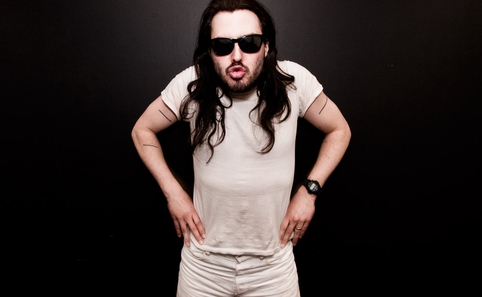


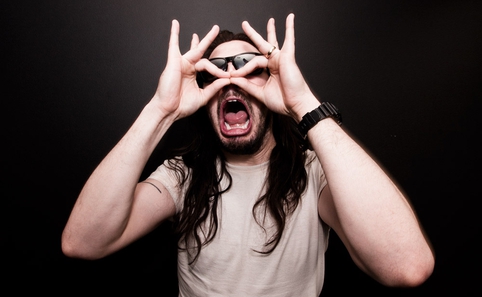


Tweets
- About Us |
- Work for Time Out |
- Send us info |
- Advertising |
- Mobile edition |
- Terms & Conditions |
- Privacy policy |
- Contact Us
Copyright © 2014 Time Out Tokyo











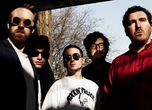
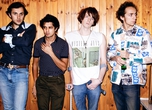
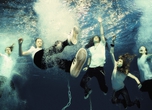
Add your comment